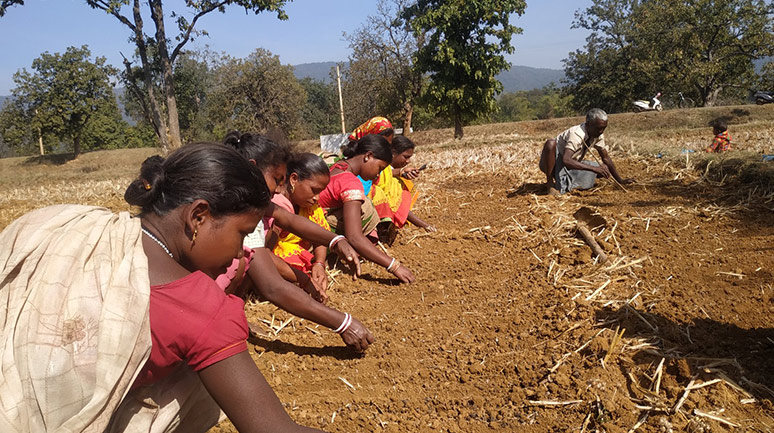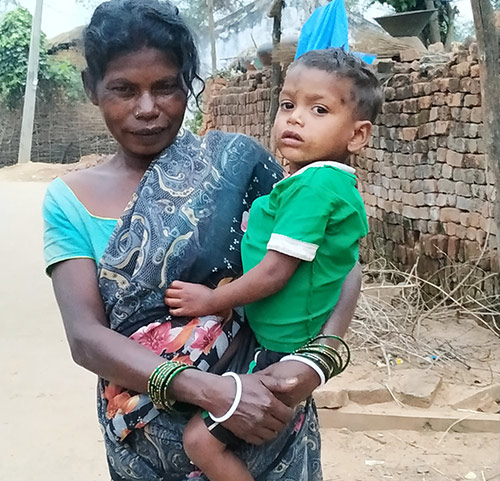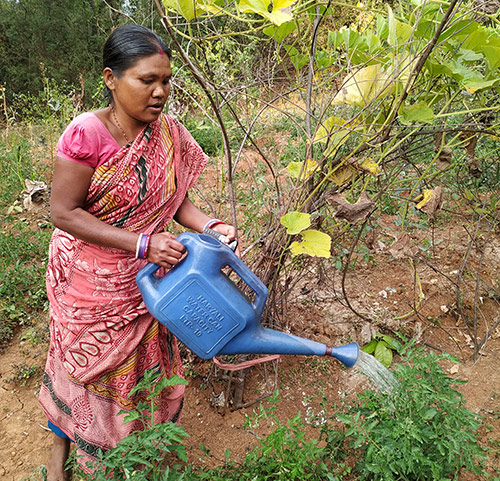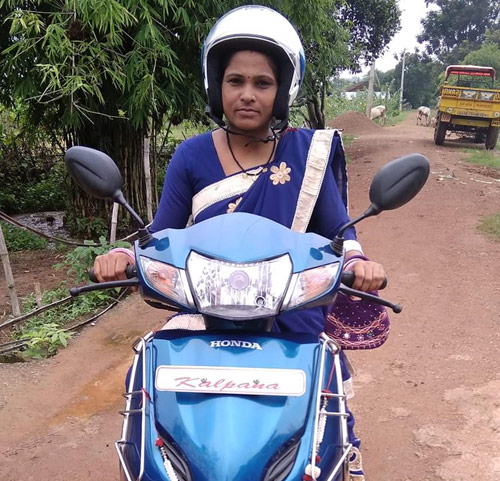Impact of the Lockdown on the Rural Women of Odisha

Fetching drinking water twice as many times, cooking and serving larger meals and more often, catering to the demands of the men folk, dealing with drunkenness, and finding resources to keep hunger at bay….village women are bearing the brunt of the pandemic on all fronts. Adding to their woes is the fact that the lockdown has cut off their participation in the SHGs, depriving them of psychological, emotional, financial and social support

W hen Prime Minister Modi announced the nation-wide lockdown on 25 March 2020, the entire country went into shock. The plight of the migrant workers walking back to their villages from every corner of the country was visible to all. News of how the lockdown has affected the general public surfaced on the TV screens. Of the diverse segments of society affected by the sudden lockdown in India, one of the worst affected is an already oppressed segment of society—women.
Let me take you to Mayurbhanj, a district in Northern Odisha, where I work as a grass-roots practitioner. More than 60 per cent of the population are of tribal origin. The main tribes include Santhali, Kolha, Bathudi, Bhumji, Munda, Gond, Saunti, Hill Kharia and Mahali. Besides these, a majority of the population comprises the Mahanta community.
Before we look deep into how the lockdown has become a curse for women, let us acquaint ourselves with what used to be their daily routine before the lockdown was imposed. Khiramani Naik (one of our SHG members) of Kaliani village wakes up, on a typical day, at 4 in the morning, cleans the utensils used the previous night and sweeps the aangan (courtyard). She then sets her backyard poultry (BYP) free for the day. It is 6 by then; her eight-year-old daughter, Mamina, wakes up and together they go to fetch fresh water for the family members. Khiramani cooks a meal for her family while young Mamina tries her best to help her mother. Other family members then have their food. Mamina leaves for school with her elder brother. Khiramani carries on her with her busy schedule, finishing other household chores, looking after the cattle while balancing agriculture work before the children return. Mamina comes back by 4 pm, all ready to help her mother through the rest of the day. Mamina has strict instructions to concentrate on her studies only after the sun sets and when she is done fetching fresh water for the family again. Khiramani, however, makes sure that her homework gets done. Awake from 4 in the morning, Khiramani does not rest for a second. Finally, after feeding her family and cleaning the chulha (earthen stove), she goes to bed at 11 pm.
When I interacted with her last, during the COVID period, she said that after the lockdown, her husband stays home. Her son returned from the hostel as did her husband’s two brothers from Surat. “During the lockdown, I have to cook multiple times. My son keeps demanding different kinds of food. I have to look after my brothers-in-law as well; they are still tired from the long journey.” She is thankful that she has got someone to help her, “Mini (Mamina) does all the trips to fetch water, now we need four trips a day.” This is Khiramani’s story. The stories of the other women in the region are no different.
"During the lockdown, I have to cook multiple times. My son keeps demanding different kinds of food. I have to look after my brothers-in-law as well; they are still tired from the long journey. "

Sabitri Naik from Kanand village, Jashipur block, watering her nutrition garden. She fetches the water from a nearby well. On average it takes almost one hour every day to water her nutrition garden. She does this work early in the morning after fetching the water for the house.
W omen in Karanjia, a block in Mayurbhanj district, have collectivized into a block-level Federation. The leaders of the block-level women’s Federation, (Sampurnna) there decided to conduct a survey with 100 women of the block, to understand the conditions of the rural women during the lockdown period. Forty per cent of the rural women reported that their daily chores have increased after the lockdown; 60 per cent of the women said that they received no assistance from the male members of the family during this period. Those women whose husbands had returned home and had no work, and whose children had returned from the hostel are the ones whose work load has increased exponentially. The women say that the men are reluctant to help their women in any way; on the other hand, they make it more difficult for them by expecting the women to do all work alone and to perfection. The women now have to dedicate more time to their children because they are indoors all through the day. Whereas, earlier, two trips to the well were enough, now they had to fetch water at least five times a day.
The survey also showed that domestic violence has increased significantly. Forty-two per cent of the women have faced or witnessed violence in their hamlets and villages. They have nowhere to go and no places to report it to. Police show no interest in registering domestic violence cases, amidst managing people during the lockdown.
“Pramila Sethi, a Board member of Syansidha, the block-level Federation of Jashipur, said, “Two girls, below 18 years of age, in my village were married and sent to their in-laws' homes. We came to know about this weeks later.” Getting young girls married during the lockdown has become even easier. The ceremonies are conducted in a hush hush manner.

“Our most powerful weapon—the village-level institutions—are incapacitated. The rights that we had fought for all these years are again being snatched from us; we are being pushed back by years because of this social restriction.”, Kalpana Mohanta, Board member, Swayangsiddha Block level Federation, Jashipur
W hen the government announced a nationwide lockdown, the first thing that the women lost were the support they could lean on—the shoulders of other women, the members of their Self-Help Groups (SHGs). These groups, which were the only medium for women to raise their voices against any kind of discrimination and violence, were not allowed to hold any meetings. The women lost their safe spaces and were confined to the four walls of their homes, which they had started moving out of after a long, tiring struggle. In compliance with the social distancing norms, the women stopped going out for farm-related work on Mahatma Gandhi National Rural Employment Guarantee Act (MGNREGA) and Non-Timber Forest Produce (NTFP)-related work.
Owing to the lockdown, everything gradually slowed down and the village-level organizations also stopped working actively. There were many restrictions on the gram panchayat-level Federation meetings as well. These collectives were the only support systems for women in the villages, and now that they stopped functioning and many restrictions were put on any sort of movement, the women were left with no help.
They were no longer allowed to gather near the wells or river banks. The moments of solace they experienced when they met other women, be it while bathing together on the river banks or while going to fetch water together, were also lost. Those were the times when they would find time to share their joys and sorrows with people they could relate to; the random chit-chat and gossip sessions they stole for themselves were probably the only means of entertainment and peace for the women, to relieve the stress of the day they had.
In such a situation, women’s financial independence, coming from their savings and other economic activities done through SHGs, also got depleted. Women engaged in agriculture are not able to sell their produce due to the lockdown restrictions. Men have returned to their homes with no money in hand; all their savings were exhausted in making their way back to their homes. Whereas families are running short on funds and women are trying hard to make both the ends meet, the male members of the family sit idle and waste precious resources at the liquor shops and create havoc in the family by resorting to physical violence and abuse. “We don’t have the money to buy pulses and our husbands spend money on handia (the local liquor), ” Molly Patra from Ektali village stated.
The health of the women and adolescent girls suffered in this period. Building immunity is essential to protect against the Corona virus. However, the didis are more vulnerable because they barely get to eat nutritious food. Despite not earning a single penny in the lockdown and not helping the women in their work, the men of the families are entitled to eat a full meal; and the boys too are given proper meals whereas the women and the girls feed on leftover food and, sometimes, go to sleep hungry. Forty-one per cent of the women have reported that they consume less food compared to other members of the family. Pregnant women too are not being able to look after their health and hygiene because of the overload of household chores; this can have harmful repercussions, including leading to miscarriages. It also increases the chances of post-pregnancy diseases and underlying chronic conditions. Nursing mothers face similar problems because their diet is not healthy and their infants do not get essential nutrients from the breast milk. Breastfeeding is an integral part of a child’s growth; if not fed properly, it can lead to a weak immune system and malnutrition.
"In such a situation, women’s financial independence, coming from their savings and other economic activities done through SHGs, also got depleted."
Most of the frontline workers—the Asha and the Anganwadi workers—in the villages are women. They are also overloaded. Looking after their own families, other women and children in their village, and reporting different data to the block administration leaves them with three to four hours of sleep. Whereas some of them are very proud of the noble work they are doing, they are also preoccupied with the thoughts of their small babies at home and the taunts of the in-laws. An Asha worker of Matiagarh G.P. said, “I wake up at three in the morning. My family is now the whole village and I have to look after everyone; I cannot compromise.”

The only time the women could meet in the lockdown period was during the paddy transplantation. Here the women from Uttaras village, Jashipur block are raising nursery beds for brinjal crop. Usually, they start this work early in the morning at around 6:00 am and then go home cook the food and after that go for paddy transplantation which takes almost their entire day.
I n these villages, the people gather and discuss the problems of their fellow mates during festivals, ceremonies and celebrations. Often, they extend their support and help other villagers to tackle their problems. Village women too have their own share of obstacles and challenges; yet, they keep going only because they have had the support of their fellow sisters. During this pandemic, times have become more difficult for the women because they cannot share their pain with others. They have never experienced such isolation before and it is harmful to all the dimensions of their lives. As the lockdown lifts, gradually, the women are trying to get back their lives. The constant increase in the number of cases in Mayurbhanj restricts free movement and makes interactions difficult even now. In these situations, PRADAN, with different stakeholders and local administration, have identified a few areas that need immediate attention.
- Ensuring that all needy persons have ration and/or pension cards through the Federation, which identifies these families, as well as single and old women, who yet do not have these cards. The Federation helps them to get these cards by linking them with the concerned authorities.
- Ensuring nutrition by creating homestead gardens. Nutri-gardens are being prepared in the backyard through Azim Premji Philanthropic Initiatives (APPI’s) nutrition and livelihood projects, and also through MGNREGA. Seed kits and saplings are being provided to the families and they are being encouraged to conserve the seeds for the next cycle.
- Raising awareness about MGNREGA laws. Village-level campaigns and trainings are being held to make people aware of their rights under MGNREGA. Once aware, they won’t be fooled and will be able to demand their rights.
- Helping people apply for job cards and ensuring that they receive them on time. Single women are especially the focus for this activity because, usually, they don’t have their own card. They work on other people’s cards and the card-holder pays them half the decided MGNREGA wage.
- Mobilizing resources to ensure livelihoods through agriculture from different line departments and stakeholders. Seeds are being mobilized from departments such as Integrated Tribal Development Agency (ITDA) and the Agriculture Department for the kharif season. Through Azim Premji Philanthropic Initiatives (APPI) livelihood funds, in some blocks, vulnerable families are also being provided with food crop, pulses and ground nut seeds.
- Making the Block Level Federation (BLFs) stronger and streamlining the mechanisms to address women’s issues in these tough times. Women Support Centres and Information Centres are the few wings that are being strengthened to deal with women-related issues.
When the women weaken economically, they also lose their dignity and fall prey to domestic violence. The lockdown has, thus, impacted these women the worst because it has added to their unending struggles and uncertainties of life. They are forced to bear the brutal brunt of it all alone. The above measures, if implemented, could bring about revolutionary changes in women’s lives.


1 Comment
Good attempt Sreeja. I could know different dimensions of the issue and the need based interventions that were the need of the hour.